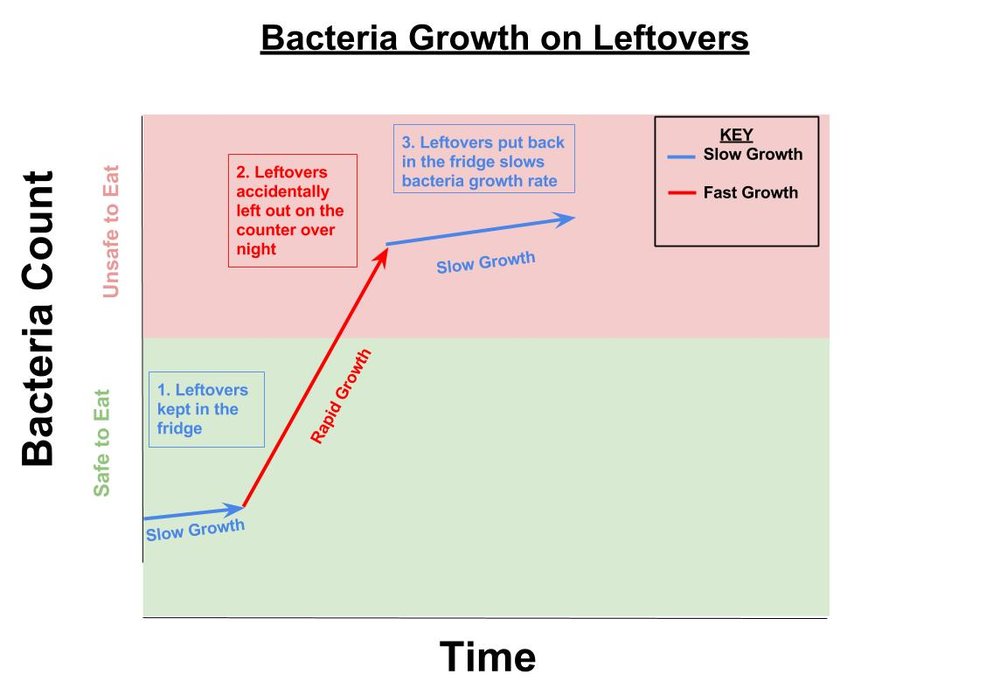
However a lot depends on the species of bacteria. Because they do not generally affect the taste smell or appearance of a food one cannot tell that a pathogen is present.
After thawing they come to life and begin to multiply.
Does bacteria die when they are refrigerated or frozen. When these conditions change bacteria are unable to grow and divide. Bacteriostatic is the effect in which the bacterial growth stops while the bactericidal effect is the killing of bacteria. Refrigeration cause bacteriostatic effect while freezing cause the bactericidal effect.
Answer and Explanation. Bacteria do not die when they are refrigerated or frozen. Low temperatures merely slow their metabolism and thus slow their rate of division.
Once frozen no bacteria can grow but contrary to popular belief freezing does not kill bacteria or viruses. As I mentioned earlier bacteria viruses and microorganisms can survive at low temperatures including freezing. How long does it take to kill bacteria in oven.
Its a combination of time and temperature. Freezing food kills harmful bacteria that can cause food poisoning Bacteria can survive freezing temperatures. Freezing is not a method for making food safe to eat.
When food is thawed bacteria can still be present and may begin to multiply. It can also help to make sure all posts are relevant by writing something new at least once every few weeks so that your readers never get bored. For more information please see our article.
Bacteria Die When They Are Refrigerated or Frozen. Bacteria do not die when they are refrigerated or frozen. Low temperatures merely slow their metabolism and thus slow their rate of division.
Any bacteria will be affected by freezing as freezing and extended frozen storage can cause extensive cellular injuries to bacterial cell walls. Probiotic frozen yoghurts that contain beneficial bacteria may therefore will have very low survival rate. Does frozen yogurt have live bacteria.
Freezing kills some amount of bacteria and germs but usually most of them enter a dormant state and stay alive in the frozen food or liquid. These bacteria are not killed. After thawing they come to life and begin to multiply.
However a lot depends on the species of bacteria. Hot temperatures can kill most germs usually at least 140 degrees Fahrenheit. Most bacteria thrive at 40 to 140 degrees Fahrenheit which is why its important to keep food refrigerated or cook it at high temperatures.
Freezing temperatures dont kill germs but it makes them dormant until they are thawed19 dec. Bacteria do not die when they are refrigerated or frozen. Low temperatures merely slow their metabolism and thus slow their rate of division.
Can bacteria grow in refrigerator. Spoilage bacteria can grow at cold temperatures such as in the refrigerator. Freezing does not kill germs and bacteria.
Instead it essentially puts them into hibernation. They are inactive while the food is frozen and will wake up as soon as the food thaws. And as the food thaws so will the moisture which means the bacteria will have the moisture it needs to survive.
Ketchup does not need to be frozen. Tomatoes have acid in them. This acid prevents bacteria from forming.
Ketchup does not even need to be refrigerated. Freezing it will not kill salmonella it will only stop it from reproducing up to the point that it comes back to the right temperature. Pathogenic bacteria can grow rapidly in the Danger Zone the temperature range between 40 F and 140 F.
Because they do not generally affect the taste smell or appearance of a food one cannot tell that a pathogen is present. Spoilage bacteria can grow at cold temperatures such as in the refrigerator. The biology major from California state has a better answer than me from an academic stand point what bacteria and viruses do for the most part is go dormant but we can also break through their films and actually disperce their materials that.
Although freezing temperatures will prevent Listeria bacteria from growing they dont kill the bacteria Chapman said. The microbes survive in the. Freezing does not kill germs and bacteria.
Instead it essentially puts them into hibernation. They are inactive while the food is frozen and will wake up as soon as the food thaws. And as the food thaws so will the moisture which means the bacteria will have the moisture it needs to survive.
But there is more to the story. In fact since the most commonly used probiotic bacteria are so fragile probiotic products are manufactured with the assumption that up to 90 of the bacteria will die before they are ever ingested by the end consumer. Improper storage is one factor that can cause a loss of bacteria.
Can you kill bacteria by freezing. Freezing does not kill germs and bacteria. Instead it essentially puts them into hibernation.
They are inactive while the food is frozen and will wake up as soon as the food thaws1 dec. At what temperature does flu virus die.